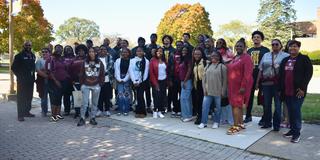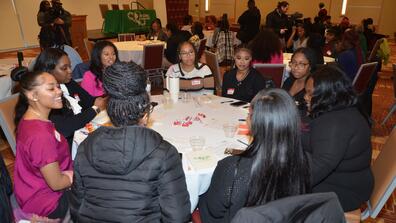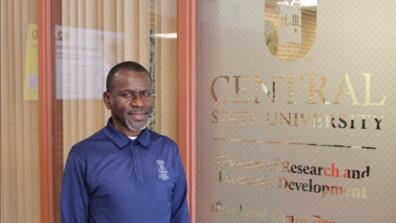Flourishing: Reflections on mental health, belonging, and the power of HBCUs

Editor’s Note: This is the third installment in Central State University’s Minority Mental Health Month series, highlighting the mental health journeys, challenges, and strengths within BIPOC communities. Previous articles explored CSU’s community-based approach to wellness and intergenerational suicide prevention. Upcoming stories will spotlight the University’s restorative justice program and reflections from students and alums.
At Central State University, mental health isn’t treated as an isolated concern — it’s a collective responsibility rooted in our identity as a Historically Black University. As the world continues to reckon with trauma, economic uncertainty, and rising youth mental health challenges, CSU students are showing what it means to thrive through connection, care, and culture. We are all part of this collective responsibility.
A new national study backs them up.
The United Negro College Fund’s recently released report, Flourishing: Bolstering the Mental Health of Students at HBCUs and PBIs, paints an optimistic picture. Among 2,500+ students surveyed across 18 institutions, nearly half of HBCU students described their mental health as “flourishing” — a term used to describe emotional resilience, positive relationships, and purpose-driven living. That’s a significantly higher rate than national college averages.
What’s behind this flourishing?
According to the report, students at HBCUs are more likely to feel a deep sense of belonging, to trust their institution’s care for their well-being, and to experience lower levels of anxiety and substance use — despite often carrying heavier financial burdens and facing systemic barriers to care.
This fact was not a surprise to one Central State student, a junior majoring in psychology.
“It’s hard, yes, but when I walk into a classroom or counseling office and I don’t have to explain my background before I’m heard — that changes everything.”
Central State University Counseling Services, led by Dr. Sonia Hunt, offers more than appointments. It provides culturally responsive care and peer-driven initiatives that normalize conversations around mental health. Programs like Real Talk circles, grief workshops, and wellness campaigns invite students to take off their masks and be fully seen.
“We’re helping students reframe mental health,” Dr. Hunt said. “Not as something broken to fix — but as part of the full picture of success, identity, and growth.”
That ethos extends far beyond campus offices. From peer mentors in residence halls to professors who check in after class, the Central State community invests in students not just as learners, but as whole people. And that’s something national data can’t always capture.
“We laugh together. We cry together. We lift each other up,” one student said. “That’s how we get through.”
Still, challenges persist. Financial stress remains a top concern for many, and gaps in access to specialized care — particularly for trauma or chronic mental illness — mean the work is far from done.
That’s why CSU continues to advocate for equity in healthcare, invest in mental health education, and build partnerships that remove barriers for students. It’s also why we honor BIPOC Mental Health Month: to amplify student voices, challenge stigma, and expand what wellness looks like — on our campus and beyond.
At Central State University, flourishing isn’t just a statistic. It’s a shared commitment. A culture. A legacy in motion.
Resources
UNCF’s Full Report: Flourishing
Mental Health America: BIPOC Mental Health Month
FDA: Supporting Mental Health in Minority Communities
Need support?
CSU Counseling Services is here for you. Visit us in the Health Center or call 937-376-6338 to connect. Your wellness is our priority — because you deserve to flourish.
If you or someone you know is experiencing a mental health crisis, help is available. Call or text the 988 Suicide & Crisis Lifeline for free, confidential support from trained counselors 24/7.


